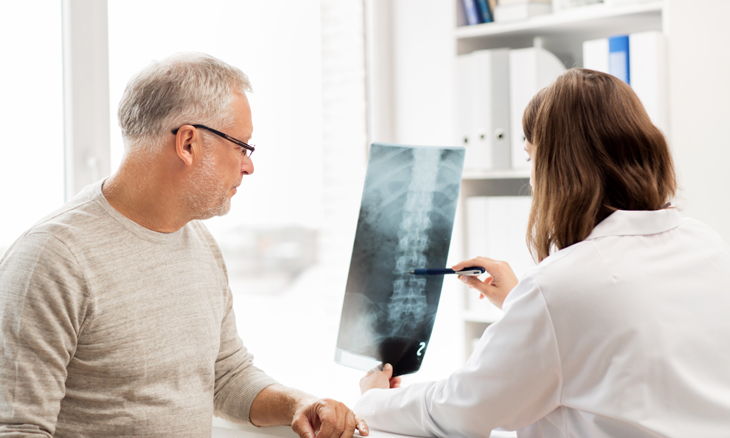
Back to Basics: The Facts about Spine Surgery
While many people suffer from some kind of back pain during their lifetime, only a small percentage will end up needing spine surgery. But for certain conditions and when other treatment measures have been unsuccessful, spine surgery may be the best option to explore, explains Bayhealth Neurosurgery Medical Director Dawn Tartaglione, DO, FACOS. Dr. Tartaglione breaks down the facts on spine surgery and when it is best suited.
Start with your primary care doctor.
For ongoing back pain, your primary care doctor will likely recommend physical therapy or chiropractic care as a conservative treatment measure first, said Dr. Tartaglione. Medications to reduce inflammation or muscle spasms may also help. “Back pain that lasts longer than six weeks and is accompanied by shooting pain or numbness down the legs can be a sign of a more severe spinal issue,” said Dr. Tartaglione. Your primary care doctor should order imaging, then refer you to a specialist as the next step. Before you make an appointment with a neurosurgeon, first consider whether you are open to pursuing surgery if that is the recommended option.
Not everyone is a good candidate for spine surgery.
In some cases, non-operative treatments may be the better choice—try alternative methods such as osteopathic manipulation therapy (OMT) or acupuncture or get a referral to a pain management specialist. Since research has shown a strong psychological link with chronic back pain, lifestyle approaches that benefit mental health such as meditation or cognitive behavioral therapy can bring relief to many sufferers.
Certain spinal conditions are better addressed through surgery.
It’s important to know that not every spinal problem can be solved through a surgical intervention. “We look for a patient’s symptoms and physical examination to match up with a spinal abnormality detected on their imaging,” explained Dr. Tartaglione. Spinal fracture, spinal tumor or infection, herniated disc, spondylolisthesis and lumbar spinal stenosis are conditions often treated through spine surgery. “We recommend spine surgery when it has the best chance of addressing the problem with the best outcome—less pain and an improved quality of life,” she said.
Find innovative spine surgery options close to home.
Bayhealth is a regional leader in advanced neurosurgical care and minimally invasive techniques to treat a range of spinal and cranial conditions. The Bayhealth Neurosurgery team comprised of three highly trained neurosurgeons and advanced practice clinicians collaborates in carrying out individualized plans that address each patient’s pre- and post-surgical needs. Using state-of-the-art technology and tools such as the ExcelsiusGPS® and the 7D Surgical FLASH™ Navigation System, Dr. Tartaglione and her team perform robotic-assisted spine surgeries with enhanced safety and precision resulting in smaller incisions and quicker recovery time.
If you’ve been battling severe back pain that hasn’t improved with other therapies, speak to your primary care clinician to see if an imaging order and referral to Bayhealth Neurosurgery are the best next steps for you. The Bayhealth Neurosurgery practice is located at 540 S. Governors Ave., Suite 100, Dover, DE 19904 and can be reached at 302-526-1470.
